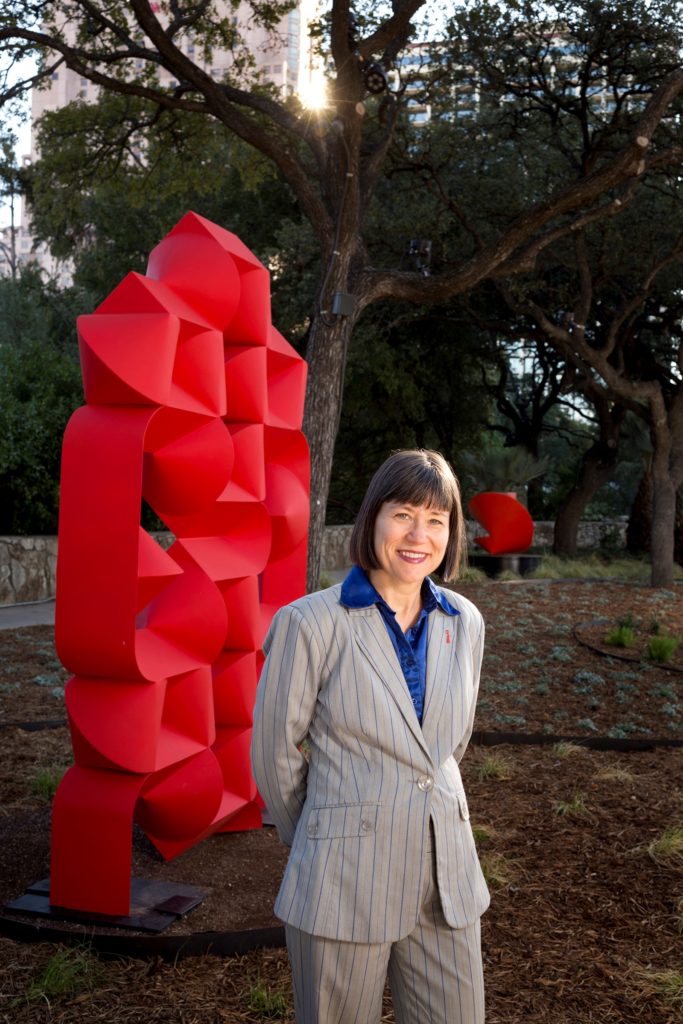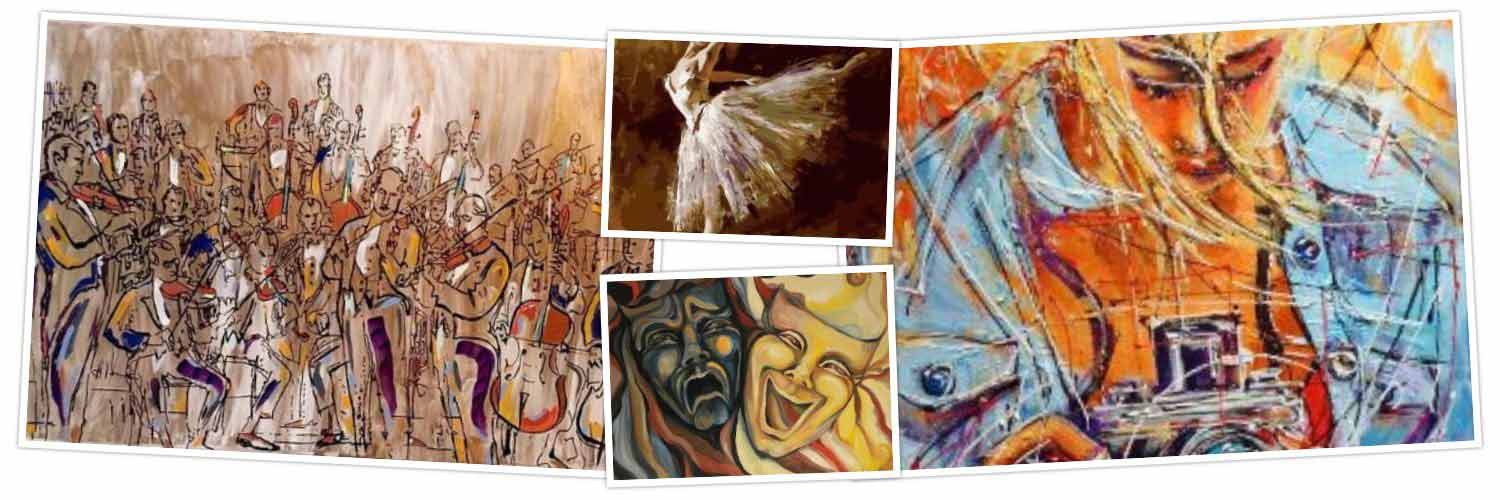Interview Express: DEBBIE RACCA-SITTRE, Director of the City of San Antonio Arts & Culture Department
by JASMINA WELLINGHOFF, Editor
What are the priorities of the Arts & Culture Department right now?
My priority is equity, in the sense that we want to make sure that art is accessible to everyone but we also want to make sure that San Antonio artists are equitably represented in the art that we promote. We are also working right now with the city management and the budget office to bring our budget back to pre-COVID levels. Most of our programs, except public art, are funded with the hotel tax. It was really devastating for our department. We had to furlough almost the entire staff during COVID. It was rough.

It was also an eye opener. Art is not just for tourists, and City Council is recognizing that. I pushed for us to get some funding from the American Rescue Plan and from the CARES Act last year. When the CARES ACT money came in, I argued that we should help art businesses, including nonprofits. You may not make a profit but you still have to make money in order to pay staff, cover expenses, etc.
And there were initiatives to help individual artists, who still had to pay rent, and eat, and all of that. We were able to give emergency grants to 130 artists in San Antonio. I thought that was great. The performing arts were hit the hardest by the pandemic.
Public Art by San Antonio artists seems to be everywhere. Is that an important project of your department?
With the pandemic, the public art program really took off because we had to shut down indoor galleries. Everybody can go outside to see public art. So, we just kept on creating new art works. It’s catching on with private companies – developers building new apartment complexes, for instance, want to include art in their design. I am very excited about that. We are working with them to help them develop processes to find and hire artists
Why did you want this job?
I didn’t actually. I worked in what is now Public Works. I’ve been with the city for 20 years. Lori Houston, who is my boss and an assistant city manager, called me after the previous A&C director retired, and she said, “Would you like to be the interim director of Arts & Culture?” I was doing budgets, contracts, real estate, etc. for construction projects then! You want me to do what? She explained that she wanted somebody who could connect with the community and she said, “You do that well.” She was right. I do like to talk to people and I like working with lots of different people… Also, I was looking for an opportunity to move up in the city structure. So, when a city manager offers you an opportunity, you don’t turn that down.
Once on the job, how did you proceed?
One of my strengths is planning. But once I joined the department, I realized that there was no strategic plan. The first strategic plan we did was for film. All these filmmakers were coming in saying, “We need incentive money; we can’t compete with Georgia or New Mexico; we can’t produce here.” So, we created a goal and a plan. We brought the film community together for several days of work sessions and emerged with the first strategic plan for film and my first plan under the Department of Arts & Culture.
San Antonio eventually became a good place for independent filmmakers to shoot their films here. However, the biggest thing we do is TV commercials. And we have people from all over the country who come here to shoot commercials because we have authenticity here in San Antonio. We have a strong historic preservation component in our city. Filmmakers are looking for backgrounds that represent something real.
The second plan we put together was for the Centro de Artes Gallery in Market Square. Again, after consulting with the community, we decided that it would be an institution for telling the story of the Hispanic experience in San Antonio… Then we moved to other plans: How to grant money to non-profits, and a plan for public art. Then, individual artists needed help, so we developed a plan to help them, too. And after that, we dealt with cultural districts, as defined by the state of Texas. We have three such districts in the city: the King William neighborhood, the downtown stretch from Main Plaza to Market Square known as the Zona Cultural, and the Old Spanish Trail on Fredericksburg Rd.
Were you interested in the arts before you took this job?
Yes, my husband and I had season tickets to the theaters; I love concerts and all different types of music. My daughter and I just went to see a K-Pop group (Korean pop music). But, in a way, it was more enjoyable before, because no one knew who I was, and it was not work. I could just relax and enjoy…Also, I have a big collection of Fiesta posters.
What does your husband do?
He is retired. He was in the military, and now he’s an artist, he paints now but he is also a musician who plays multiple instruments.
You are the mother of three children. Did you have to do home schooling during the past 15 months?
My kids are older. My youngest is 14 and she could handle things on her own. Another one is in college, and I have one who has already graduated from college a few years ago; he lives in New Jersey. All my kids are very artistic.
How about you?
I am more of a writer. I used to write poetry, but I just haven’t had that much time to do it lately.
What was the hardest thing to deal with during this pandemic?
The hardest thing was when I had to tell my staff they were furloughed. I think I cried more than they did. But some of them were relieved because they had to home-school their kids during that time and couldn’t figure out how to do it all. Unfortunately, we did lose some good people. They just found other jobs.
Are you from San Antonio?
I am actually from Castroville. I always thought of myself as Alsatian because Castroville is Alsatian. My maiden-name, “Sittre,” is French. “Racca” is my husband’s last name. He’s Cajun, so he has a French connection, too. My mother and I like to do genealogy research and we found out that we are actually descendants of the Canary Islanders. We traced our lineage back to two original families that settled in San Antonio. It made me feel that this is really my city. I belong here and I love this city.
What do you remember best from your childhood?
I grew up on a farm. There was a lot of work, but what was nice is family was always there, close. My father’s parents lived within walking distance from us. We all spent a lot of weekends on Medina Lake, and my husband and I still do. I actually live in my grandparents’ house now.
What did you want to be when you grew up?
I wanted to be a rock star. I wanted to write songs and play music and jump around. I feel like I am a rock star, just not a musician rock star (laughs).
You are now a leader and a boss. What do you think are the most important strategies/practices to keep everyone happy and optimize the work environment?
You have to value what people do. You put people in certain positions and, hopefully, you can help them expand their talents, rather than focus on their weaknesses. You have to believe in people and help them believe in themselves.
What do you worry about?
A lot of things worry me. I worry that someday people won’t value history and culture and authenticity. I see some of that already. There are people who just focus on “Let’s make money! Let’s make money! We need to think about the future of our children, and what we are doing to our community and our planet. I worry about my kids’ future life… You know, there’s a lot of intolerance in the world. Look at Simone Biles and what’s happening to her. She’s having a mental health crisis and people are ragging on her.
When you find yourself in need of advice about either your personal or work life, who is the person you go to for that special talk?
I have a lot of support. My husband, my mother, who lives right next door. Also, friends and colleagues. But it really depends on the issue that I am dealing with. I try to find someone who is knowledgeable about that issue. I have the tendency to think that I know everything (chuckles) – maybe it’s part of my personality – but I am always open to listening. One difficult thing about working for a government structure is that once you make a decision on how to proceed, it’s very hard to go back on that decision. But sometimes you have to say, “I was wrong. We need to change course.”
In addition to your job, what else are you good at?
One thing I have become really good at is technical writing- writing procedures and policies, and I love doing it.
If you wanted to pleasantly surprise your husband, what would you do?
I did something like that for our anniversary a few years ago. I planned a trip to New York to see “Hamilton.” It was great. People love it when you do something special for them.
What accomplishment are you most proud of?
My kids… (then after a little hesitation) I do feel like I have made a major impact on this city, and not just in the arts. When I was doing construction, we transformed the way project management was done, we transformed how we contracted with people and how we dealt with people. What I really hope is that these things, including the strategic plans I created, can continue longer than me.
Last question: If you were the all-powerful ruler of San Antonio, what would you choose to change/implement?
I would like to eliminate crime and homelessness. I think if people just loved and respected one another, many problems would be solved.
————————————-
